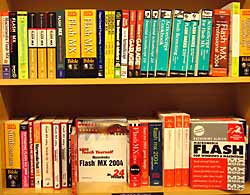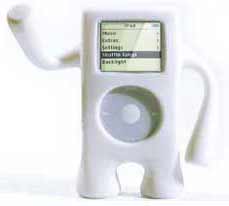
It’s a display case for software manuals.

As such, it’s a testimony partly to the awfulness of computer software and partly to the stinginess of manufacturers who no longer bother to provide proper documentation for their products.

It’s a display case for software manuals.

As such, it’s a testimony partly to the awfulness of computer software and partly to the stinginess of manufacturers who no longer bother to provide proper documentation for their products.
Here’s an interesting story. A small coffee shop in Seattle has become so concerned about the change in atmosphere brought about by its free WiFi connections that the owners have decided to switch off the service at weekends. The cafe’s co-owner told Glenn Fleishman that they had added free Wi-Fi when it seemed their customers wanted it a couple of years ago.
It initially brought in more people, she said, but over the past year “we noticed a significant change in the environment of the cafe.” Before Wi-Fi, “People talked to each other, strangers met each other,” she said. Solitary activities might involve reading and writing, but it was part of the milieu. “Those people co-existed with people having conversations,” said Strongin.
But “over the past year it seems that nobody talks to each other any more,” she said. On the weekends, 80 to 90 percent of tables and chairs are taken up by people using computers. Many laptop users occupy two or more seats by themselves, as well. Victrola isn’t on the way to anywhere; it’s in the middle of a vibrant stretch of shops and restaurants on Capitol Hill’s 15th Ave. It’s exactly the kind of place that you want to sit down in, not just breeze through.
Worse than just the sheer number of laptop users, Strongin noted, is that many of these patrons will camp six to eight hours—and not buy anything. This seemed astounding to me, but she said that it was typical, not unusual. The staff doesn’t want to have to enforce the cafe’s unspoken policy of making a purchase to use the space (and the Wi-Fi), and on the occasions that they approach a non-buyer about a purchase asking, “Can I get you a beverage?” the squatter often becomes defensive, explains they’ve bought a lot in the past or just the day before.
“It’s just really really difficult. We’ve had so many heated debates about it. We want people to linger at the cafe. We’re not a fast-food coffeeshop. We want people to feel comfortable staying here as long as they please,” Strongin said.
Hmmm… I know of at least one person who has built a substantial little software business by working in such a cafe and riding on its free broadband link. Wonder if he’s offered to give them some of his subsequent profits.
Interesting piece in the NYT.
From the 1986 to 1996, Microsoft’s stock soared more than a hundredfold as the company’s Windows operating system and Office applications dominated the PC industry. That explosive climb made millionaires of employees who had accepted options as a substantial part of their compensation for 60-hour workweeks fueled by a diet of Twinkies, Coca-Cola and marshmallow Peeps. The sudden riches led many to refer to themselves as “lottery winners.”
“While the exact number is not known, it is reasonable to assume that there were approximately 10,000 Microsoft millionaires created by the year 2000,” said Richard S. Conway Jr., a Seattle economist whom Microsoft hired to study its impact on Washington State. “The wealth that has come to this area is staggering.”
Even allowing for this particular consultant’s contractual obligations, it’s true that Microsoft has enriched many employees who have gone on to fund worthwhile projects. One of them, a friend of mine, gave over £1 million to UK charities before he died.
From an interesting article in the New York Times about another subversive use of podcasting.
If you soak up the Jackson Pollocks at the Museum of Modern Art while listening to the museum’s official rented $5 audio guide, you will hear informative but slightly dry quotations from the artist and commentary from a renowned curator. (“The grand scale and apparently reckless approach seem wholly American.”)
But the other day, a college student, Malena Negrao, stood in front of Pollock’s “Echo Number 25,” and her audio guide featured something a little more lively. “Now, let’s talk about this painting sexually,” a man’s deep voice said. “What do you see in this painting?”
A woman, giggling, responded on the audio track: “Oh my God! You’re such a pervert. I can’t even say what that – am I allowed to say what that looks like?”
Hmmm… An interesting way to bring younger generations back to great art?
Today’s Observer column.

A keyboard with blank keys. According to the Blurb,
Since there is no key to look at when typing, your brain will quickly adapt and memorize the key positions and you will find yourself typing a lot faster with more accuracy in no time. It is amazing how slow typers almost double their speed and quick typers become blazing fast!
Hmmm… Jolly useful for writing blank verse though (sorry). A snip at $79.95.

Photographed on Dingle Quay on Sunday.
According to the International Herald Tribune…
President George W. Bush spent an hour and a half Saturday riding a mountain bike at his Texas ranch. With him, as usual, was his indispensable new exercise toy: an iPod music player loaded with country and popular rock tunes aimed at getting the presidential heart rate up to a chest-pounding 170 beats per minute.
Which brings up the inevitable question. What, exactly, is on the First iPod? …
First, Bush’s iPod is heavy on traditional country singers like George Jones, Alan Jackson and Kenny Chesney. He has selections by the folk-rock singer Van Morrison, whose “Brown-Eyed Girl” is a Bush favorite, and by John Fogerty, most predictably “Centerfield,” which was played at Texas Rangers games when Bush was an owner and is still played at ballfields all over America. (“Oh, put me in, Coach – I’m ready to play today.”)
The president also has an eclectic mix of songs downloaded into his iPod from Mark McKinnon, a biking buddy and his chief media strategist in the 2004 campaign. Among them are “Circle Back” by John Hiatt, “(You’re So Square) Baby, I Don’t Care” by Joni Mitchell and “My Sharona,” the 1970s song by The Knack that Joe Levy, a deputy managing editor in charge of music coverage at Rolling Stone, cheerfully branded “suggestive if not outright filthy” in an interview last week.
Bush has had his $300 Apple iPod since last July, when he received it from his twin daughters as a birthday gift. He has some 250 songs on it, a paltry number compared to the 10,000 selections it can hold.
Bush, as leader of the free world, does not take the time to download the music himself; that task falls to his personal aide, Blake Gottesman, who buys individual songs and albums, including greatest hits by Jones and Jackson, from the iTunes music store.

Er, a “bendable, posable friend for you and your iPod”. Get one from here. Or not, as the case may be. Wonder if Dubya would like one?
Podcasting is an interesting development, but currently is not for the technologically naive user. Steve Jobs has announced that within two months Apple’s iTunes will offer support for podcasts. Lots of people are pondering what this might mean. Here’s Eric Hellweg on the subject.